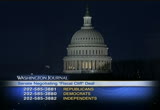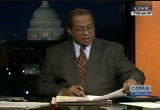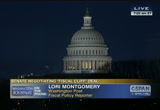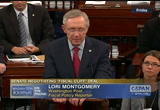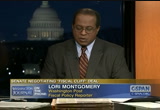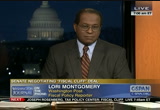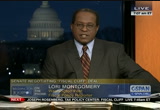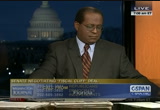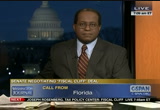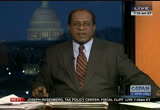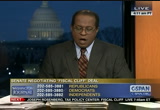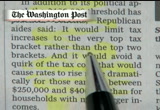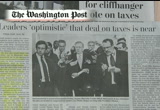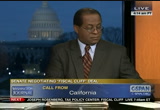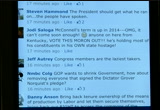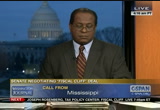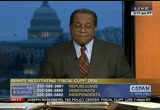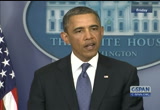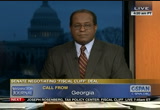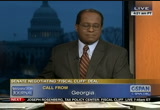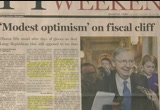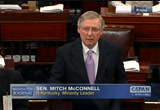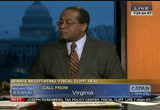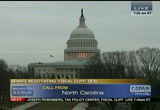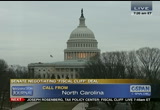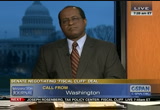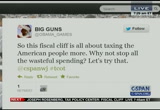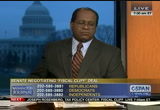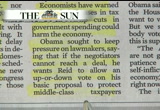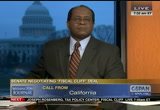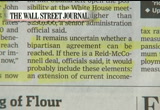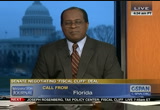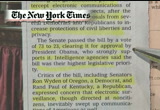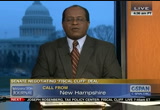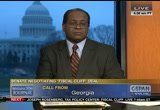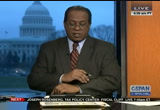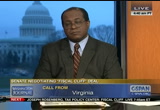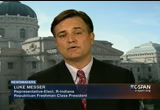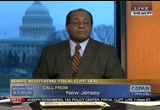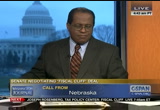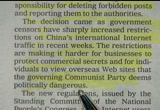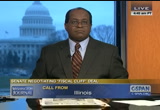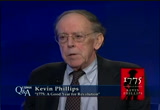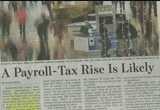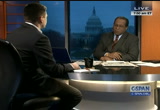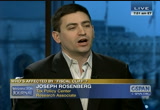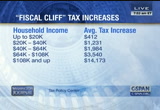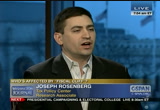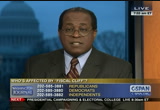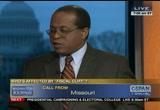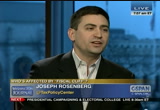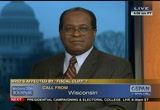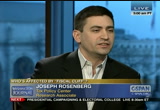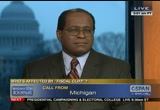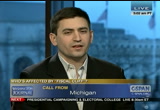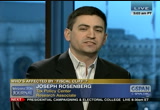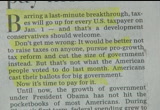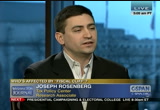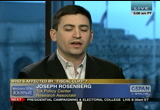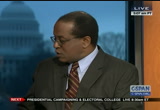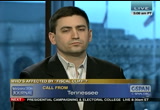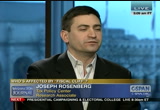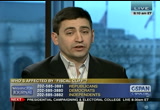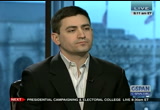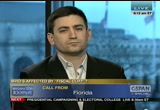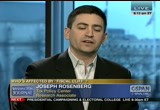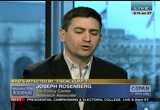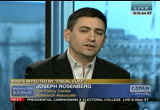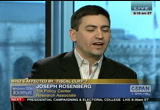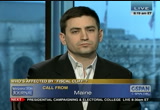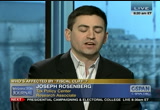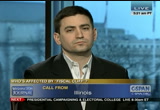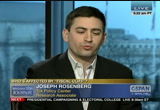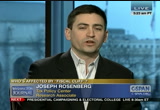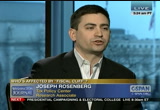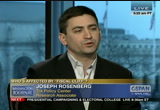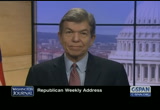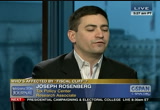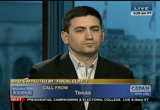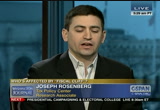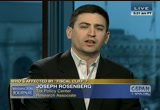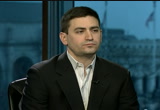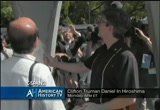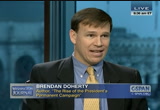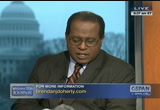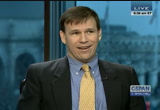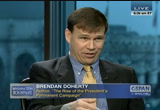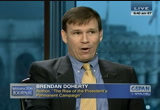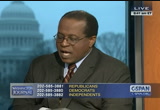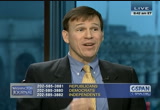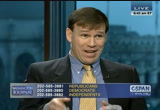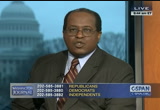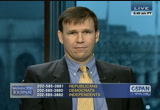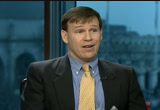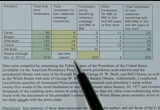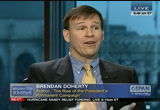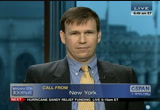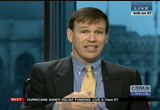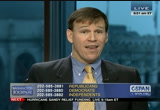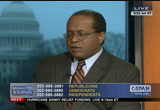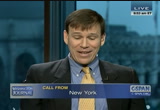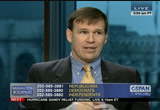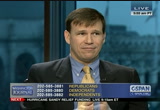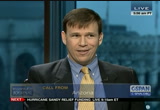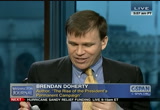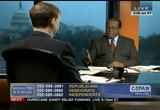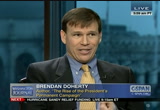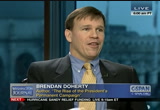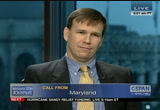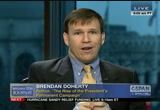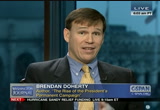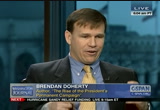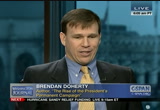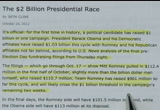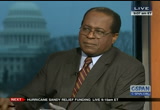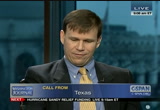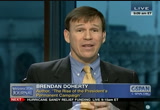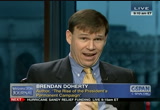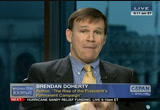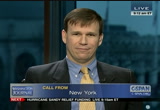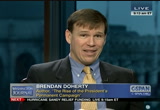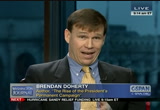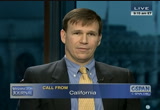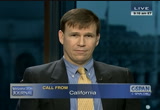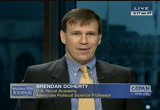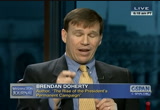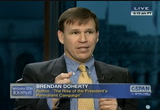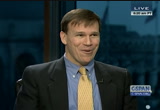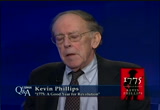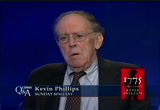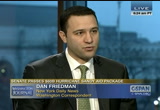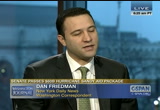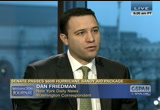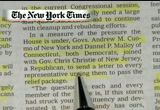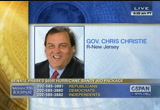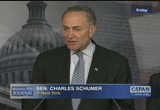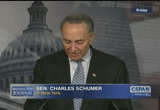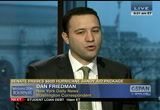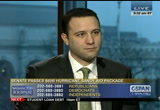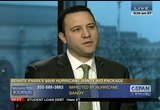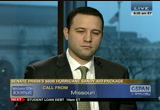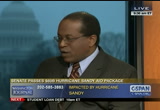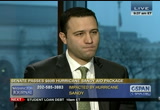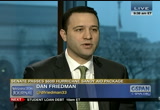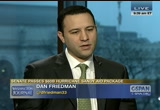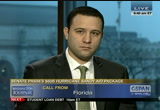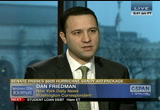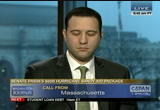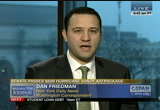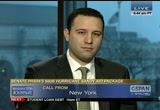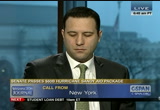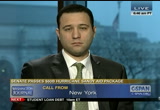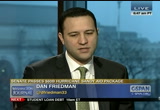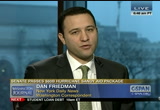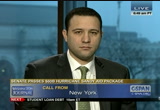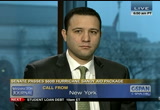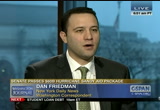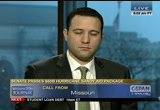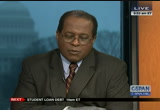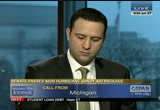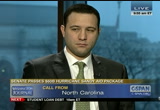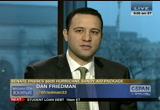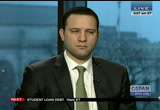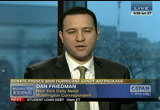tv Washington Journal CSPAN December 29, 2012 7:00am-10:00am EST
7:00 am
campaign and the influence on the electoral college with brendan doherty. later, dan friedman has an update on the hurricane sandy relief bill making its way through congress. "washington journal" is next. >> nobody will get 100% of what they want. let's make sure middle-class families and the american economy and the world economy are not adversely impacted because people cannot do their jobs. host: the headline in this morning's "washington post" -- president obama and senate leaders were on the verge of an agreement that would let taxes
7:01 am
rise on the wealthiest households while protecting the vast majority of americans from tax hikes set to hit in january. welcome to the saturday edition of "and the washington journal." for the first 45 minutes of the program we are going to be talking about senate negotiating a fiscal clifts deal, what has been going on on that half of the capital. see what they are talking about and how things are going. we want to get your input and your part of the conversation. you can reach out to us on twitter. facebook, facebook.com/cspan.
7:02 am
and you can send us an e-mail. this is more from the article, the lead story in "the washington post." they ride, the development marked a breakthrough after weeks of paralysis. joining us by phone is one of the authors of that article, and, laurie, welcome to the program. tell us, what kind of a deal did the president offered? what is new in the negotiations among the senators and between the senators and the white house? caller: there does not appear to
7:03 am
be anything new. the policies they are talking about are the senate has been on the table for weeks and weeks and weeks. they seem to have finally agreed that they are going to move forward with something. there is no guarantee that the republican leader and the democratic leader will be able to put together an agreement, but they are at least not say what they are going to try to do is work together and they are aiming towards a vote. host: what is with the rank and file senators and house members on whether they can pull this thing off before the end of the weekend? caller: it happen so late. it was really difficult. i do not believe anybody has been briefed. there is a lack of information among the people who are actually going to have to vote on this. house members are not in washington right now. they will not be in until sunday evening. senators are here, but they're
7:04 am
not in session today. the leaders wanted a day of peace to pull this together. people are going to start to get briefed tomorrow afternoon. host: both majority leader harry reid and mitch mcconnell both expressed optimism after the meeting with the president. what is the basis of their optimism? is this a sign we might be one step, two steps, through step closer to a deal? caller: it does appear we are a step closer to a deal. they are talking about doing is extraordinarily popular stuff. except for the big marquee item, which is letting taxes rise on the wealthy. the rest of the stuff they are looking at doing the stuff they do all the time. it is extending an expiring tax policies. they know the benefit businesses.
7:05 am
extent college tuition credits. there are looking at protecting people from the alternative minimum tax. it is all very urgent stuff that needs to be done. there are only two remotely controversial pieces of this, that is what to do with the estate tax and to how to define the wealthy people whose taxes are going to go up. the rest of it is, basically protecting people from tax hikes. i guess extending unemployment benefits and sometimes controversial for the republicans. it appears to have agreed they will do that if they can reach an agreement on the tax stuff. it should be relatively easy if they can just reach an agreement on what to do about taxes for the rich. >> in your article this morning, you " harry reid said, what ever we come up with will be imperfect. some people are not going to like it. some people will like it less.
7:06 am
it seems like he is making his decision. he is moving forward with this. what is it going to take to get the rest of the folks to go along with them? caller: we will not really know that until tomorrow. i think that one of the problems that they are going to faces what we are hearing is they do not expect to be able to turn of the sequester, which is the automatic spending cuts that are set to hit enter january. the obama administration has some ability to blunt the effect of the cuts. there are a lot of people of in the republican party who are very upset with the cuts that would hit the pentagon. it may be difficult to rally republican votes of the cannot turn off the sequester.
7:07 am
on the democratic side, the estate tax could be a problem. the republicans are insistent that the estate tax stay at current levels, which is exempting the state of $55 million at a relatively late 35% above that level. many democrats would like to see -- in january it is expected to come -- taxes are expected to go up dramatically. as small as $1 million would be taxed. most democrats want to see something in the metal. they are adamant that we cannot exempt states as large as $5 million. that could be another sticking point. >> do we expect anything going on today? if not, what is the earliest of the senators will come back in for session tomorrow? caller: i think the senate is due back in at 1:00. the house is due at 6:30.
7:08 am
the house is the big question mark here. it is very difficult to imagine what could pass the house. as for today, that is an excellent question. the senate is not in here the house is not an. my understanding as we are going to have basically everybody working quietly to see if we can reach an agreement. it will be interesting to see if they give us any information today. host: you can find her articles at wp.com. thank you for being on the program. we are talking about senate negotiating the fiscal cliff deal. the work they're still trying to get done. the first call comes from lee in florida. caller: i tried to call in yesterday, but everybody was concerned about this matter. let me give you a website that i have been e-mail in over 400 people. it is the website -- you go to
7:09 am
search "cause of war." this is the biggest cover up by all of the politicians of their in washington, d.c., including both bushes and of mr. obama. host: and what does this have to do with the senate negotiating a fiscal of deal? caller: let me tell you something. if you go to the website listed on the left and upper side, united states -- each tax coming out of each state is going towards the or. -- war. i believe all of these politicians, mayors, governors should take a half cut pay to pay down the deficit. host: we are going to move on to darwin on the line for independents.
7:10 am
caller: it is like the pentelikon, back in 1968 i was even fighting with the pentagon over budgets. you always had to have everything kept the same. nobody was going to change anything because next year there were going to pop everything by 10%. they told you got to worry because you would get 10% more. that goes all the way back to 1968. they just keep dwelling on one thing over and over again. i would like to know from the boston globe or the herald is asking for pictures of -- host: let's move on to del on the line for democrats. caller: this is an outrage that they cannot tax the wealthy by an additional 4%.
7:11 am
this is the lowest tax rates that have ever paid in the united states. considering that their incomes are vast compared to what they used to be many years ago when they paid a much higher rate, they are wealthy and they do not want to pay. 4% does not amount to enough to affect the deficit. maybe we ought to consider 15% or something like that. france passed a thing if you go over $1 million a year, your taxes are low on the first million. after that, they are taking 75% of the money. they ought to throw a little bit of fear into these people. it just shows the control the wealthy have over the government in both parties. host: more from "the washington post." they write --
7:13 am
back to the telephones. derrick from maryland on the line for democrats. your thoughts about the fiscal clause bill. caller: i think they will do a good deal if they can keep mitch mcconnell out of there. one of the things i really have a problem with, that is when thing i say democrats, let's get the ground game for 2014. republicansd of the at enter the house. let's take the house and just ran it all down their throats. host: we will move onto glen on the line for independents. caller: here is the problem that we have a. we have people that are working hard for the american people. we have a constitution. we have deviated from the
7:14 am
constitution. host: who are the people working hard for the american people? caller: the american citizens. it takes two american citizens -- your mother and father have to be american citizens to be the president of the united states. we need to have a confirmation hearing. on the birth certificate it says -- i am not a bertha -- but it says his father is from kenya. that makes a not a natural born american citizen. host: we are moving onto tom on the line for independents. caller: hello, how are you. i want to say that i believe both parties here are sociopathic. i do not think any one of them is really concerned about solving this problem that is really going to affect all americans. the american people basically have to wake up and realize that obama is crazy.
7:15 am
john boehner is also crazy. none of them have any inkling, let alone a loyalty or fidelity, toward what would be good toward the american people. it is all about them. obama is going to retire in four years. he is looking at making millions of dollars on a speech circuit after that. john boehner is going to become a lobbyist. none of them care. host: we are going to leave it there. we have some items from . a couple of folks up in weighing in on facebook. -- a couple of folks have been weighing in on facebook.
7:16 am
back to the telephones. ruth on the line for democrats. caller: they talk about the fiscal clef, but they are not really interested in fiske's -- fixing the fiscal cliff. there are interested in their own party. they have been against the president from the beginning, so they are not going to change anything. they do not want to help america.
7:17 am
what people are they for? the people have spoken, but they do not ever listen to the people. what people are the working for? host: james in new york as a deadline for independents. caller: i just want to point out something. 400% to 1000% increase in salaries versus the workers for the so-called job creators, along the way, the people are not making these increases in salaries. they talk about cutting taxes on the wealthy. well, what about giving money -- a fair percentage of an increase to the people that are doing the work? i never hear anything about that. it just seems to me that the unfairness starts there. host: that is james and new york. the lead story in this morning's boston globe with the headline
7:18 am
"modest hope." [video clip] >> i just had a good and constructive discussion with senate and house leadership about how to prevent the tax hike on the middle class. i am optimistic that we may be able to reach an agreement that can pass both houses of in time. senators harry reid and mitch mcconnell are working on such an agreement as we speak. if an agreement is not reached in time between senator harry reid and harry mcconnell, then i will urge senator harry reid to bring to the floor a basic package for an upper down vote, one that protects the middle class from an income tax hike, extends the vital lifeline of unemployment insurance to 2
7:19 am
million americans looking for a job and lays the groundwork for future cooperation on more economic growth and deficit reduction. i believe that such a proposal could pass both houses with bipartisan majorities as long as they allow it to actually come to a vote. if members of the house for the senate want to vote no, they can. which of but everybody vote. that is the way this is supposed to work. -- we should let everybody vote. if you can get a majority, which should be able to pass the bill. host: that was the president yesterday. he talks a little bit more about that in the "washington -- the wall street journal" this mornign ng.
7:20 am
7:21 am
they know how important it is to the american working man, they know how important it is to business and our country and worldwide, if they cannot reach a deal, vote no to any income. vote your party. do not vote for any incumbent, period. host: we are two years out from the next election. you say if this thing does not work, star of the campaign not to vote of the incumbents? caller: start it now. start the campaign now. they want to start campaigning earlier and earlier, we as the american people need to send a message now that if you cannot do it, if you cannot do your job, then we do not want you there. host: john in south carolina on the line for democrats.
7:22 am
caller: the morning. listen very carefully. some of these people, they are all about money. ever since they are in office, some more against him. if i was the president and they do not do their job, i would come to the american people and say, listen, let's spend enough money to pay ourselves out of debt and start from scratch. all of those jobs will come back from china because the dollar will not be worth. that is what is it is a bout. host: on the front page of "the financial times."
7:23 am
we also have a tweet. this is what the senate minority leader said yesterday on the floor after his meeting at the white house. [video clip] >> i share the view of the majority leader. we had a good meeting at the white house. we are engaged in discussions, the majority leader and myself a in the hopes that we can come forward as early as sunday and have a recommendation that i can make to my conference and the majority leader can make to his conference. we will be working hard to try to see if we can get there in the next 24 hours. i am hopeful and optimistic. >> we are talking about the senate negotiating a fiscal could deal on -- but one of the stories of in the paper comes from the baltimore sun with the
7:24 am
president of in there headline saying the president modestly optimistic. let's see what the thoughts are of the viewers and listeners this morning. pamela from new jersey on the line for democrats. are you optimistic about the fiscal clefts deal? caller: i do not think there will be a fiscal cliff because i think it will cost too much danger. i would like for the republicans to be definitely voted out and new people come in with better ideals. there are stuck in the old school. host: cheryl in virginia on the line for independents. caller: thank you for taking my call. i just wanted to say we are tired of partisan politics. we know that the what they do not pay their fair share of taxes, and they know it, too. the working man and the middle class carried the burden of this country including the tax
7:25 am
burden. if mitch mcconnell and republicans had worked with the president of in the first term, we would not be near a fiscal cliff. we need term limits. i do not think they ought to serve more than the president can serve. host: a year limit on both the house and the senate? caller: absolutely. rockylet's move onto a from north carolina. caller: good morning. i would like to make a general comment about the congress and the senate. somehow they have gotten off track for the american people. they need to bring jobs back to the united states. president obama promised in his campaign to lower the corporate tax rate, which i believe would bring some corporations back to set up their factories of in
7:26 am
america and said of china, india, brazil. it just seems like congress and our leaders in general are trying to bring america down equal to the other nations of the world. i believe it is all headed for a one world government. they have to knock america down before they can get us equal with the other countries in the world. we are building the other countries up. it's a cinch to me like our leaders reject i agree with the last caller, there should be term limits. after they are in there so long, their interest is not in helping america. it seems to me like they are positioning for money in their own pockets or they become lobbyists. this secreted a law that they should not be able to become lobbyists for a few years sucker they leave congress or senate.
7:27 am
they need to just bring america back up. if it would bring more jobs back to america, then we would have more taxes to be collected. host: more in the financial times this morning. capitol hill plays out a cliffhanger is the headline. the right the mood of the members matches the state of negotiations, l tempered, resentful and having their christmas breaks interrupted by another partisan budget impasse and in no frame of mind a compromise.
7:28 am
we are talking about the senate negotiating a on the air. caller: thank you for taking my call. i am going to join the democrats, at least most of them, i hope. i am so disgusted and so disheartened. i feel that the republicans are being obstructionists on purpose. that is obvious. anyhow, they need to -- it is not about parties and politics anymore. it comes down to looking out for america. ok? host: why do you think they are being obstructionist? what do they have to gain by doing that?
7:29 am
caller: they want to control everything. it is greed, power, and money. ok? that is my opinion. it is time to think about the people. i like the $400,000, personally. i would have liked to see the $250,000, but it is getting to the. -- i should probably not said this on national tv -- i feel they have a moral obligation to look out for the american people. we elected them. host: we have another tweet. you can send your comments to twitter. the address is @cspanwj or give us a call like irwin on the lien
7:30 am
for republicans. caller: how many illegal aliens are in our country? we talk about creating jobs. how many illegal aliens? how many taxes are they paying? how about their employers? how much taxes are they paying? they're not paying any taxes? about obamacare? us do something about obamacare. let's not have obamacare. let's get everything down 25% or 50%. our government is like a big fat pig. host: so you say go off the cliff and invoke sequestration? caller: not just that. let's stop everything and have a national discussion and actually talk to real people, like real americans. have the reporters that work for obama go out and talk to real people and said, what do you think we should do? what do we have to do in our family?
7:31 am
7:32 am
back to the telephones. patrick and los angeles on the line for independents. caller: happy holidays. i just want to say, maybe the $400,000 compromise is not such a bad idea right now. is not that far off from $250,000. i agree with what people are saying about the party politics -- the partisan politics. maybe obama sabina example right now and make a little compromise. -- maybe obama should lead by example right now and have compromised. what about a 10% flat tax? when not make everybody happy and flat tax everything? host: back to the telephones. caller: yes, they do not talk
7:33 am
about the things -- you talk about taxes. what about taxing us on our wages? the supreme court voted against that. they do that -- in know, the poor people are getting poorer. the middle class is cut out. are either rich or you are poor. there is no middle class anymore. host: and that the wall street journal, their front page --
7:34 am
back to the telethons, panama city on the line for republicans. go ahead. caller: yes, good morning. i just wanted to say, we should be able to vote to congress out on no-confidence. we should have been no confidence bill to get them all out. >host: do you think that would work? caller: it would be better than what we have now. look at what it costs us per day. we are in a gridlock. it is causing tax payers millions of dollars. let's vote about and start over. host: what makes you think if they brought in 535 new people that the situation would be better than it is right now? caller: it would not be better than it is right now, but it would be better a in the future. it would get to a better place.
7:35 am
7:36 am
mike on the line for independents. your thoughts on that the senate negotiating the fiscal clift deal? caller: i would like to take a step back. this is a discussion on philosophies. i think the basic difference in philosophy between two parties. i think the solution really is to come up with an agreement that will make everybody equally unhappy and explain that this is for the benefit of all of our children. host: what would be an agreement that would make everybody unhappy? caller: if you told republicans there would be means testing and they are not going to get some of the benefits like medicare or
7:37 am
social security because they have wealth in their lives, it would make them happy, but they could afford it. if you told democrats that we are going to cut some benefits to try to get the deficit under control -- if this other republicans are also taking cuts, maybe they would go along with the things. i think there are a lot of people in the system that the benefits that they do not need. host: this is one of the editorials in this morning's "financial times."
7:38 am
that is one of the editorials and "the financial times." on the line for democrats, you are on "the washington journal." your thoughts on the senate negotiating a fiscal clift deal. caller: my thoughts are that if you pay attention to everything that has been going on, it is that everything that our president obama has tried to implement for the american people, the republicans have been against it. from the beginning, mr. mitch mcconnell, all of them. you know, would you say your interest is to not let him be president for a second term, that means you have to go against everything so he would not be significant, like you are trying to tear him down. you are tearing everybody down.
7:39 am
this is my thought. how is it that we the american people allow our senators and representatives to go against our better good? nothing they have done has been for the american people. it is not so hard to see that everything they have done has been to hurt not just the middle class, the poor. people on social security. everything the talk about is hurting other people. is it those that have the most that want to keep the most and make the ones that have the least pay for all the most the want to have? we have to wake up and get out and vote. this is not -- if we had got out and vote in 2010, this will not be happening. host: a couple more items from a facebook this morning.
7:40 am
back to the telephones. david in fairfax station, virginia is on the line for republicans. caller: i am just calling because of a caller a feedback stating that congress needed to be all ago and all the people needed to come in. i think it is important to note that congress is done their job. they did their job in may, september. this and everything to the house, and the house has said on it. harry reid and our president that needs to be voted out.
7:41 am
they are destroying america. host: we have part of an interview from our newsmakers program this week, rip elect luke messer from indiana. he will be able to see the interview on sunday at 10:00 and at 6:00 on c-span. this part of the interview we want to assure you, he is talking about speaker john boehner's challenges as leader. he says he expects mr. boehner to be reelected as speaker. [video clip] >> i think he has a hard job. when president obama makes a decision for the executive branch, that is the agenda for that branch of government. the speaker cannot do anything more than the votes he can obtain for any part of the agenda. i have heard very little of any kind of uprising.
7:42 am
i expect the speaker will be elected. i anticipate voting for him. host: you will be able to see the entire interview on sunday, tomorrow morning, at 10:00 a.m. and again at 6:00 p.m. on c- span. it is also available online at c-span.org. back to the telephones. then on the line for independents. caller: good morning. the only reason it happens between republicans and democrats is because the republicans are better that obama won a second term. they are obsessed with making his presidency a living heck. i just believe that there is
7:43 am
common ground. you cannot penalize somebody for being successful. host: we also have this tweet. sean in lincoln, neb. on the line for democrats. caller: i think it is very disingenuous to be thinking about most of the stuff we're thinking about. if there is an allocated five other to fund this war and that to be brought back and we can use this money, it is very disingenuous to be standing around complaining about food stamp recipients. the shortfall in the medicare funds, it is the weakness of the lawmakers for not building a revenue trigger to be able to fill that.
7:44 am
7:45 am
negotiating a fiscal clause deal. caller: good morning. i am calling about the taxes. if we are going to increase taxes, we should be paying down the deficit, i would think, rather than using it for more spending. just blindly raising taxes seems to be the wrong way to go about it. we have some much money hidden in offshore attacks and there are some in tax loopholes that people can get around paying their taxes. we need to simplify the tax code and go after some of the money that the rich are hiding offshore. that would be a lot better solution them blindly taxing. then use the money to pay down the deficit. host: thank you for calling. thank you for all of the other callers who participated in this
7:46 am
segment of the washington journal. we are going to take a break. coming up after the break, the fiscal clef. how would your finances be affected if it does happen? joseph rosenberg will explain how that could occur. how much time as a sitting president spend fund raising? we are talking about how reelection efforts have become an increasing amount of the president's time. that is coming up today is saturday, december 29. we will be right back. [captions copyright national cable satellite corp. 2012] [captioning performed by national captioning institute] >> i will tell you what, i met my first conservative -- a friend of a friend. i had never met a conservative
7:47 am
and in my life. i was impressed by him because he answered questions -- he was composed and patient and simple and he was not rancorous. he tried to gauge his responses to the level of my request and he was very welcoming. over the course of the year, i thought i do not understand anything he is saying, but he is so polite. maybe there is something in his convictions. >> playwright and reformed liberal david mamet on his current stand on social and political issues. his latest is "the secret knowledge." on c-span 2's "book tv." >> we really started to get rid in the summer and follow 1774. the british admirals' and
7:48 am
diplomats for reporting to the crown that the colonists are sending ships everywhere to try to get ammunition and muskets and cannons. this was after the british had sent more troops to boston after the boston tea party and the so- called coercive acts. it is clear that the colonists were pulling together ammunition. maybe they did not intend to use the canon, that was a big debate. basically they prohibited british ships from taking ammunition and everything to the colonies unless it was officially sanctioned. there were very alert to this. as soon as the colonists found out about the council prohibiting ammunition from being sent to the colonies and the hampshire and rhode island, patriots and melissa took over the fortune to the ammunition.
7:49 am
everybody knew it was coming and the winter of 1774 and 1775. >> he suggests 1774 and 1775 was the critical launching. of the revolutionary war and american independence. host: joseph rosenberg is a research associate with the tax policy center and joins us to talk about who is affected if the fiscal of comes to fruition. to go along with that, one of the articles in this morning pose a wall street journal had the headline "a payroll tax as likely."
7:50 am
if we go over the cliff, how will the payroll tax be affected? >> the payroll tax is one of the components of the fiscal cliff. as the article points out, most of the discussions and plans that have been back-and-forth of not involve extending that. with that essentially means is that come the first paycheck entered january, federal withholding for social security will increase and take home pay will drop by about 2%. host: from what you have seen and heard of the negotiations that have been going on back and forth between the white house and the senate and the house, what other items are you most concerned about regarding how going over the cliff is going to affect the average american?
7:51 am
guest: it is interesting. most of the discussion thus far has focused on the individual income tax provision. for the most part it had been in effect for the past 10 years or so since beginning in 2001. interestingly enough, one aspect of the fiscal clefts does not actually -- it is not about 2013 taxes, but it is a leftover business from 2012. most importantly, that is congress has not yet enacted its annual fixed to the alternative minimum tax for this year, yet. if no action is taken, a lot of people probably have not even heard of the alternative minimum tax, a tax that normally affects 4 million taxpayers would insnare more than 30 million taxpayers. and really complicate the tax filing system that begins in january. host: explain what the
7:52 am
alternative minimum tax is and why it was put in place? ye, now, all of a sudden more people might be subjected to it than previously? guest: it is basically a parallel tax system alongside the regular individual income tax. it was initially designed to make sure that a small group of high income taxpayers were paying some minimum rate of tax. because of its nature and explicitly because it has not been indexed for inflation it would affect more and more taxpayers down the income ladder. the major -- the alternative minimum tax disallows certain deductions and exemptions.
7:53 am
most notably, exemptions for persons and their dependents and the deduction for state and local taxes. those are the real reasons why people find themselves on the amt. host: we are talking with joseph rosenberg, a research associate with the tax policy center. we want to show the viewers household incomes and the average tax increase that they might expect if we run the car off of the cliffs. for people up to $20,000, they can look forward to a tax increase of $412. between $20,000.40000 dollars, an increase of $400. an increase of $1,900, almost $2,000. between 64,000 and $800,000, if that is your income range in expected tax increase of $3,500.
7:54 am
if you are -- you can expect a tax increase of $14,173. tell us the differences between what the white house wants and what the republicans want in a final deal. how far away are they on coming together on this? the good news is it is relatively similar for the majority of taxpayers. the debate is more or less which tax cuts to extend and at what income levels the should be extended for. ever since the president's first election campaign in 2008 has
7:55 am
maintained that the tax cuts should be allowed to expire for incomes over $250,000 on the other side, there were some additional tax cuts added in 2009 as part of the stimulus acts. those that primarily benefit low and middle income households, the republican plan would not extend those. host: we are talking with joseph rosenberg. if you want to get involved in the conversation, the numbers are on the screen. you can also send us messages via e-mail and twitter.
7:56 am
the conversation continues on facebook. the first call comes from grade in missouri on the line for republicans. caller: let me talk a little bit, will you, pedro? we have $16 trillion of in debt. tax of the rich people, we make $80 billion. last 10 days. where can you justify taxing the rich? it does not make sense to me. if you keep taxing us, people will move out of the country. they're moving out of california because they're getting taxed. keep in mind that this is ridiculous, and i think the president has put us in a terrible situation. host: he should get your television tend because pedro is a much better looking individual that i am. guest: i think it is important
7:57 am
to draw a distinction between what the current debate is all about, which is what changes are policy makers going to make for next year. the debates right now is a very short term debate about tax and spending policies over the very short-term. that debate is not going to be the final debate. there is still plenty of issues that we are going to need to deal with with the more medium and longer-term structural issues with our tax and spending policies. that is really a much larger debate. it certainly is true that taxing the rich or really any one solution is not going to be sufficient to solve the entire problem. it is going to take several or
7:58 am
many different pieces to fix the larger issue. host: next up is wesley on the line for democrats. caller: how are you? good morning. well, france has a luxury tax of 75%. fighting a renouncing it is unconstitutional. i guess if we're going to go off the cliff, we will go off the cliff. the pen is mightier than the sword. the people that put us there, get rid of them. as all i can say. host: do you think going to a luxury tax would be the way to go? caller: i think so. the comparative luxury tax on the big yachts on the water down in florida. -- they can put a luxury tax on the yachts on the water in florida. guest: i think it is useful to
7:59 am
step back. what happens if we go over the fiscal cliffs or even we get the type of deal that the president is looking for? what we are talking about is the top individual income-tax rate rising from 35% to 39.6%. that was the same texture that we had before 2001. -- that is the same tax rate that we had before 2001. we do not need to be up at the 75% level. i would not advocate that we go to the 75% level. that is not really where we are. that is not where we need to be. host: we hae a tweet. guest: the payroll tax is basically a fixed percent, at 2% of income.
8:00 am
it is capped, so social security tax only accounts for the first 100 dozen dollars of earnings. the benefits are larger or more an important probably for low and middle income working families than they are for higher income families. you have to remember that the payroll tax was a temporary provision. it actually was enacted at the end of 2010 to replace another provision which was even more targeted toward low enand middle income working families. i don't think anybody would dispute that it needs to expire, the question is whether that time is now or whether it should go on a little bit longer. that's a debate that we could have but i will point out it
8:01 am
doesn't seem to be a part of the current debate and very likely it won't be. host: joseph rosenberg is with us for charitable giving. back to the phones. jack in allenson, michigan, on our line for independents. go ahead, jack. caller: i want to ask mr. rosenberg if he has ever heard of lincoln electric in cleveland, ohio. host: and why did he wanted to know that? caller: well, they wrote a book, james f. lincoln wrote a book, a new approach to industrial economics where they have no unions. everybody is responsible for their own work.
8:02 am
they do peace work. everybody's responsible. everybody has a lifetime job. they get huge pieces of the pie. and ownership is -- the people, the workers, everybody owns the piece of the pie. host: what does this have to do with the fiscal cliff? caller: well, if more -- if more people -- if more industries would go to that, they wouldn't fall off the cliff. everybody would go to work. host: mr. rosenberg? guest: so i haven't heard of that but it sounds like a great place to be and live. i would have to get the name of that again. host: next up is don on the
8:03 am
washington redskins. -- "washington journal." caller: i've been on social security for several years now. it's my understanding that the amount of money that you pay in through the payroll tax affects the amount of social security that you receive and it looks to me like people are under the illusion that this 2% is a good deal but at the same time, why they're going to be shortening themselves when they retire. is that right? guest: so that's a good question. it actually isn't really right. so the payroll tax is basically being used as a vehicle to deliver the tax cuts to workers. the way the federal budget accounting works is that the money that is not going into the social security system via the
8:04 am
reduced payroll tax, is being reimbursed from general revenue so the reduced -- the reduced payroll tax from the last few years will not affect benefits that you accrue for the future. host: mark of the american enterprise institute writes under the headline "make the middle class pay more." he says -- host: your thoughts about what mr. threesen had to saw.
8:05 am
say. guest: i differentiate the debate we're having that it's basically about the tax system for next year and maybe the year after. and a longer term debate about tax and spending policy. and i think going forward, especially after the economy has a chance to fully recover and is on stronger footing, then i think it is not only a reasonable but necessary for taxes to go up relative to what they have been the past few years and even over the past 10 years to rise to slightly higher levels in order to meet the spending needs that the country
8:06 am
seems to long. host: ed is in columbus, ohio. he's talking to us on the democrats line this morning. ed, you're on the "washington journal" with joseph rosenberg, research associate at the tax policy center. caller: thank you, good morning. mr. rosen berg, with the fiscal cliff blooming, do you believe the i.r.s. will be able to calibrate their system at this late of a date and would the debt ceiling debate blooming, could that delay federal refunds? thank you. guest: yes. the question about the i.r.s. is a good one and it is an important one. so it almost is certainly bound to complicate the filing season. i think already the i.r.s. has said that they are -- they have not released updated withholding tables for winner to. -- 2013. what that means is employers will use the withholding tables
8:07 am
for federal income tax. but if a deal is made or no deal is made, that's going to have to change and at some point, employers will have to change their federal income tax withholding amount. i mentioned with the alternative minute 34u78 tax, that will -- minimum tax, that will complicate the season. i think the i.r.s. has said as many as 70 million tax filers could be subject to delays if the a.m.t. is not patched for 2012. host: antonio in nashville, tennessee. you're on the "washington journal." go ahead. caller: good morning, gentlemen. thank you. i'm going to say i'm going to guarantee you guys that there's no -- there's not going to be a fiscal cliff because the fiscal
8:08 am
cliff compass more than just taxes. you've got the quester and the unemployment insurance. the republicans and democrats know that they can't afford to go back in a recession at this point and the republicans are going to get blamed for it. the taxes still increased and y'all promised not to do that and on the other hand, if they make a deal now, they can go back and say look, we're not in total control. we only control the one branch of government so we made a deal to keep the taxes, you know, low on 98% of the country and that's to win. and as far as the sequester, the afford to lose all those military jobs. that's 100 million jobs possibly lost. and then you've got the unemployment, you know, two million people unemployment, they can't afford not to have that revenue injected into the system so i believe come monday,
8:09 am
they're going to have a deal. i believe it. there's not -- they are not -- i'm going to guarantee you you guys. host: eve got a guarantee from antonio. joseph rosenberg who makes a living researching this material. are you willing to throw your lot in with our last caller? guest: you know, i think he's probably on to something. now, i mean, i'll point out that the deal doesn't have to come next week before the 31st. it would be better if it did but then again, it had been better if it came last summer or the year before. there is time to do the deal in early january or even later than that and retroactively make all the fixes and there is likely not to be significant effect and i think the deal that -- and i think the likelihood that
8:10 am
something like that happens by mid to late january is very high . now, i mean, again, we've talked about that. that doesn't mean that everything will be avoided. so the payroll tax likely will not be part of the deal. so we will -- it is while it is very likely that we will not go over the fiscal cliff as it were in its entirety, there will be changes that take effect to some extent. host: we have not for pub is one of our tweeters and says that wants to know what 2012 filings does the fiscal cliff effect? -- affect? guest: so we've already talked about the alternate niff minimum tax. that's the big one. but there's a host of expiring tax provisions that lumped together and usually referred to
8:11 am
as the tax extenders. and a number of them expired at the end of 2011. aside from the a.m.t., it includes things like on the individual side, an adoption credit, the ability for individuals to deduct state and local sales taxes as well as on the business -- there's also a host of tax provisions on the business side. all those are things that are expired for the 2012 tax year, but is possible will be resurrected in any fiscal cliff year. host: joseph rosenberg, research associater with the tax policy center. to find more information about not only mr. rosenberg at their website, taxpolicycenter.org.
8:12 am
we've got another -- no, we don't have another tweet. let's go back to the phones. milton in miami, florida, on our line for republicans. go ahead. caller: good morning from warm south florida. host: ok. caller: i have a question and your ph.d. candidate might be able to answer this. is the president looking to actually raise more tax revenue or punish people? because history tells us that if you lower tax rates, you take in more taxes. so what's he trying to accomplish here? that's number one. number two, only in washington could they take a mathematical problem, mainly social security, and cause it to be a political problem. is there a way to fix either one? host: take the first part of that -- guest: take the first part of that. i take issue with the idea that
8:13 am
tax cuts increase revenue and the converse that tax increases would reduce revenue. that's not the historical experience. that's not the view of virtually every economist that i've met. look, it's important to remember that really what we're talking about is extending current tax cuts. and the question is which tax cuts should be extended and for whom. taxation is not an economic science. it definitely -- if you gather 10 people in a room, you're going to get 10 different opinions and the views on taxing -- on the merits and philosophy of taxing individual asks the rich will vary.
8:14 am
but, you know, this sort of immediate problem is not necessarily the larger philosophical question. it really is the more practical question of what is our tax system going to look like. host: and we've got this lead editorial from this morning's "wall street journal." real housewife offense the beltway. they write -- host: back to the phones. don in oklahoma city on our line for democrats.
8:15 am
go ahead, don. caller: good morning. i have a couple of quick comments i would like to make. the first is that i find it ironic for so many years in recent history republicans have claimed to own patriotism yet they don't seem to want to vacate their fair share. host: joseph rosenberg. guest: you know, i mean, i'm not sure, you know, i'm not sure this is about pay. -- patriotism or anything like that. you know, the question of who should pay taxes and how much is again, as much a political question and is as it is, an economic question. you know, i mean, i think it's important to remember that the sort of recent history of the sort of evolution of the income
8:16 am
distribution in the united states where we've seen increasing income inequality and an increasing share of pre-tax income earned at the very top. and so a sort of -- it's a certainly valid debate to say well, should our tax system recognize that fact and adjust and look to first raise taxes at the very top before going down the income ladder? but again, i think ultimately, we're going to have to look to raise revenue at all income levels to some extent and that's probably inevitable. host: earlier, we talked a little bit about how this is going to affect taxpayers, but what is the i.r.s. doing? how are they preparing for whether or not we go off the
8:17 am
cliff? do they have a plan and a plan b? guest: so i'm not exactly sure. i'm sure there is considerable lengths at the i.r.s.. obviously, it is difficult for them to prepare tax forms when the law is not set even yet for 2012, let alone to tell employers how they should withhold taxes in the coming year. so, you know, it's certainly a case of a solution that comes more quickly is better for -- from their point of view. host: we've got a tweet from wild and wonderful and she says all of this could not -- all this would not be happening? mitt romney had won in november. right, because when g.o.p. is in the white house, deficits don't matter. can you tell us a little bit
8:18 am
about the philosophies of the two candidates? well now, the president and the ex-candidate. will the situation be that much different if there was a different man in the white house? guest: well, look, it's an interesting question. it is certainly true that tax policy was one of the key sort of issues in the last election. and actually, the debate that we're having if it sounds familiar, it's because we've had it several times before. it was really a similar debate to what we had in 2008. we had the same debate in 2010. we had a similar debate in 2011 when we were dealing with the debt ceiling issue the first time around. and we dealt it with it in the last election. and the differences have always been that president obama has maintained that tax cuts should
8:19 am
be allowed to expire for people making more than $250,000. mitt romney called for extending all the tax cuts fully. and making other changes to the tax code. but, you know, i mean, he wouldn't be in office right now anyway. so i think we would still be here talking about what to do come january 1. host: all right. david in maine on our line for independents. go ahead, david. caller: yes. i've been around for a few years and i've seen this coming since 1970. when revenue -- when wages did not go up, revenue doesn't come into the government. and when we constantly spend and promote money, shipment overseas, shipment job overseas, and we blame people like me on social security, you know we're
8:20 am
elite on systems. excuse my language. host: david, we're going to leave it there. joseph rosenberg. guest: it is true right now that tax collections are at near historic low but that largely remains a result of the still weak economy. and so when the economy went into recession in late 2008, tax collections really plummeted and have remained low both because incomes have remained low and we have enacted counterfiscal policies that have reduced taxes further. that will reverse itself to a larger extent that's economy recovers and especially if things like the payroll tax cut expires and other of these tax cuts expire. so, you know, going forward, tax
8:21 am
collections will stabilize and rise. there are still a long-term or medium and long-term structural imbalances between revenue and spending that will need to be addressed. but that's a fight for another day. host: we have got -- we had a tweet there. let's go back to the phones then. joe in makinaw, illinois, on our line for republicans. go ahead. caller: yes. i just like to remind my republican friends that what we have is a problem here of imbalance. we cannot go into an austerity program like mr. rosenberg has been talking about. we cannot have an austerity program and grow our way out. we have to spend more. and i'm so happy that mr. rosenberg has said that he's
8:22 am
debunked this idea that when you have lower tax rates, you increase revenues because that is complete fallacy and he has been very good about stating that situation. host: how much more do you want to see us spend? joe? caller: how much more do i want to spend? host: yeah. caller: well, i think he's right when he says that taxes have to go up on everybody eventually. but what the president is doing is he has maid his political statement to get re-elected and it got him re-elected and -- host: and we're going to leave it there. joseph rosenberg. guest: yeah, no. so i don't disagree with a lot of what the caller said. it is important to point out that the real danger of the fiscal cliff is not -- is not an
8:23 am
issue of high deficits and high debt levels, but rather is the idea that we would go too far too fast for the direction of deficit reduction and austerity to borrow the word of the caller. so really, the question is how much -- so the past few years, you could think of the federal government as appropriately putting its foot on the accelerate to help a weak economy. the question is how quickly and -- how quickly the government should ease off the gas pedal, what the fiscal cliff is essentially taking the foot off the gas, putting two feet on the brake pedal and standing up. that is not what we want to do. the question is finding the right balance that still
8:24 am
supports a vulnerable economy, yet begins the process to renormalize the revenue level of the federal government. host: now we've got the tweet from a fussy liberal. it says it's time to be a liberal and -- host: how much of the fiscal crisis can be attributed to the war into the afghanistan that were not part to the original budget? caller: it is -- guest: it is instructive to go back. if you look at the current deficit over $1 trillion, still a majority of that is related to the recession that began in 2008.
8:25 am
however, it is certainly true that going into that recession, we were dealing with structural deficits that were result-a-result of tax cuts initiated during the bush administration and higher spending levels as well. and so you know, all of those play a role and it's certainly true that at the end of the day, more or less, what we decide to spend as a society, as a government, we have to then raise in taxes. so we cannot independently choose the level of taxes and the level of spending at some point sooner, those are to more or less balance. host: joseph rosenberg is a research associate at the tax policy center and we're talking to him about who's affected by the fiscal cliff. we've got about another five
8:26 am
minutes left in this segment. we want to show you our listeners and viewers a little bit about what center blunt of missouri had to say. he is doing the republicans radio address this weekend. and he talks a little bit about the president's proposal to raise taxes on the top 2%. let's see what he has to say and we'll get a response back from joseph rosenberg. >> the president's proposal to raise taxes on the top 2% of the americans won't pay one third of the annual interest that is owed on this debt. the president's tax like -- hike would only fund the government for eight days. americans deserve to know what is what do we do for the over 357 days of the year? inaction shouldn't be an option. the problems facing our country are big but they're not necessarily all that complicated. the president will never have more political capital than he
8:27 am
does right now and the next few days will begin to define his second term. he was elected to lead. we can still avoid going over the fiscal cliff if the president and the democrat control senate step forward this week and work with republicans to solve this problem and solve it right now. host: joseph rosenberg, your thoughts on what the senator had to say. guest: well, look, i'm not interested in getting in the middle of the political back and forth. you know, i think the main -- the first idea is similar to an earlier caller about this sort of insufficiency of only taxing the rich. and that's certainly a valid point. i think, again, there's -- you
8:28 am
need to draw a distinction between what we're currently talking about the immediate issue of what our tax system will look like next year and then -- and separating that from the longer term issues of tax and spending in which there are, you know, real philosophical differences about the role of government in social insurance in providing health care and how we're going to raise revenue going forward. host: our next caller comes from chris in houston, texas on our line for democrats. go ahead, chris. caller: hi. i'm just saying that payroll tax, we really don't get a tax relief because at the end of the year, we had to pay -- we get less back from the government on
8:29 am
our income tax. and what the payroll tax does, it just gives us more money during the year. and one other thing. president bush had a surplus at the start of his term of being president. instead of giving that tax rate to the rich, he should have put that money into medicare. what kind of fool doesn't see the babyboomers coming into their health issues? host: joseph rosenberg. guest: so just as a point of clarification, so the payroll tax cut, it is not recaptured at the end of the year. so that is -- for the past two years, the tax rate has been reduced by 2% that has basically
8:30 am
been trickled out in paychecks in the form of lower withholding throughout the year. but is not later recaptured at the end of the year with a higher tax. host: next up is mickey in kings port, tennessee, on our line for independents. go ahead, mickey. caller: good morning. first of all, let me say that i am definitely not in the rich class. i'm closer to the bottom as the top. but my question being fair, what's wrong with having a fair tax or an equal tax where no matter what income level you have if you make $10,000 a year or $10 million a year, that you pay the same percentage on your gross income or we tax everything that's sold. that way, there's no way of getting around the deductive from the incomes? -- income tax? it doesn't make sense to me the
8:31 am
way the program is set up. thank you. 12k50 host: guest: we're transitioning the media issue of our current income tax to whether we should fundamentally rethink our tax system. the idea of sort of flat taxes or national retail sales tax, taxes have long been proposed and talked about. i mean, i think fundamentally, it sounds appealing, but, you know, what you're really talking about is relative to what we do now. you're talking about a much different way of raising -- much more revenue from lower and middle income people and less from the very rich. my sense is that's not where the american people are at.
8:32 am
there is this sort of sense that higher income people raising the dollar revenue from them is sort of less harmful than it is from lower income folks. so, i mean, those debates are worth having, but i think when you actually get down to the specifics and play it out, things like a straight flat tax or national retail sales tax don't make a lot of sense. host: we've been talking with joseph rosenberg, a research associate at the tax policy center. if you want to get more information about the work that they do, you can go to our website, taxpolicycenter.org. part of the urban tax policy working center. thank you very much for being on the program. guest: thank you. host: when we come back, we'll take a look at how much time a sitting president spends on
8:33 am
re-election with brandon daughtry. we'll be right back. >> the chief of staff had to make a plan for the invasion of a japan without considering the atomic bomb. it was estimated that the land would cost 700,000 men and 250,000 of our youngsters and to be killed and 500,000 of them that would be maimed for life.
8:34 am
>> as somebody in the middle of this, i choose to honor both, both the sacrifice and -- of american servicemen fighting their way through the a.f.c. and the little girl who died as a result of the atomic bombing. it's unimaginable what that must have been like to be close to that to the epicenter where that fireball originated in the blast. >> follow the journey to hiroshima. the president's eldest grandson discusses meetings with bomb survivors and the experience of the meeting through his trip on c-span3. >> as president obama begins his second term in office, what's the most important issue he
8:35 am
should consider for 2013? >> if you're in grade six through 12, make a short video about your message to the president. >> it's c-span student cam video competition. the deadline's january -- for more information go to studentcam.org. >> i like the congressional hearings. i like auto the stuff also about the educationle stuff like all these policymaking situations i'm very interested in i think it's a great thing that washington, d.c. has all these things and c-span covers it. >> eric lowe watches c-span on comcast. c-span, created by america's cable company since 1979, brought to you as a public service by your television provider. host: brendan doherty is the
8:36 am
author of the rise of the president's permanent campaign and he's an associate political science professor at the u.s. naval academy and is here to talk about presidents and their campaigning and fundraising. welcome to the program. guest: thank you very much for having me. host: how has the campaigning and the fund raising change or altered the job of the president? guest: what i do in my research is i focus on the president's time. most look at money raised but time is the president's scarcest resource and over the last three and a half decades, the president has spent more and more time raising money and they've -- there are always more important things that the president can do than he has time to do. so more time fundraising means less time doing other things. host: who makes the decision on how much time the president is going to do the fund raising? somebody in the white house or there are people in the parties?
8:37 am
caller: it's a combination of white house staff who are dedicated to thinking about elect trarl matters and outside staff. in guest: the decades ago, it was outsourced to the committee but ever since the establishment of the white house office of political affairs in the reagan administration, we've had white house staffers who have been devoting their time to coordinating electorial factors when it comes to presidential action, decision making, allocation of time. host: now we're going to take a look at a chart that shows fundraising in terms of time and events. and in this first column here, says total first-term
8:38 am
fundraisers. now president carter had 85. president reagan had 80. george h.w. burks 137. bill clinton, 167. george w. bush, 173. and then president obama through november 5 2012, i guess the day of the election, had 311 -- 3 10789 why such a jump between president carter and president obama? is it just the cost of running these campaigns? is it television ads? writes all this money going if guest: it's a very good question. if you want to understand what presidents do, you have to think about what the rules of the system are that incentivize their action. so the rise in fundraising is really a story about the consequence of campaign reform. if you want to empty your let to a presidential candidate, you could give them $25,000.
8:39 am
over the last few decades, campaign costs have exploded. the rational is that -- rationale is that we want to have small amount offense money to limit corruption or the appearance of corruption. so the idea is if i can only get a certain amount of money from you, and every person i know, i'm not going to be behold on every certain but with rising president costs, the president is spending more time raising more and more money. the other piece is that the kind of presidential public funding which for decades held down the amount of time the president sends fundraising. there are two different systems. they both are based around the premise that candidates and presidents receive public money for their campaigns in exchange for limiting their expenditures. but the money is no way close to running an effective campaign. both barack obama and mitt
8:40 am
romney raised and spent close to $1 billion. with the irrelevance of public funding, there's more and more pressure to spend more and more time raising money. host: in fact in some of the months, both the clinton campaigns and the clinton and the romney campaigns raised $150,000 in just one month. caller: absolutely. it's a whole different world. -- guest: in ronald reagan's campaign, he attended three fundraise but i couldn't find a single fundraiser for his re-election campaign. because he took general money and in the nominating process, he was unopposed and the spending cap was $25 million and that was it. he was able to hit that mark by sending out vice president president bush and having a direct mail fundraising operation to the extent that the campaign manager said they had to return money after they
8:41 am
exceeded the limit on what they could spend under public spending. host: we're talking with brendan doherty, he is the author of "the rise of the president's permanent campaign." also an associate political science professor at the u.s. naval academy. if you want to get involved in the conversation, call the number on your screen -- host: we're going to talk about how the president chooses to
8:42 am
travel around the country based on the return on what he's going to get in the electrical college. talk to us about that. guest: it's a winner take all basis. so it made no sense for governor romney to spend more time for texas or california or new york or any other state. so we would expect as the election is close that presidents and presidential candidates focus on those states that they might win or lose that they either carry or yield to the other time. so when does that start? so what i did is built a massive state of where the president travels going back to jimmy carter's inauguration and it
8:43 am
turns out that every president since reagan has disproportionately visited electoral states in most of their gleers office. -- with -- host: so states that you say states that key like ohio, north carolina, new hampshire. guest: right. host: they get more visits than california and new york because those states are pretty much in the bag for whichever whether democrats or republicans for texas guest: yes. and they get more visits and their population alone can predict. and this is the whole idea that this book started back in 2003. so this is not just a president
8:44 am
obama story. both when it comes to fundraising and to the strategic travel. president bush was spending so much time in ohio and florida and pennsylvania and there's alcs all sorts of coverage that this had to do the electoral college. and it's easier to say -- easy to say this is electorial related but i want to look at it systemically and those states that ended up being battleground states for a president's re-election campaign did tend to get more visits from the population alone would have predicted and the same is true for new hampshire and iowa. host: our first caller for brendan doherty comes from eric in seedertown, georgia, on our sign for democrats. caller: nothing was going on until the black man, president
8:45 am
obama got to become president. mitt romney did not put any of his money into his campaign election. these are things -- these are rich millionaires and billionaires. they don't have to disclose how much money they are actually giving. so the electoral college was based on a certain group of people so in order to keep the election so they can control and do what they want to. if you look at what's happening now, you have a more diverse population and it's a certain amount of states. a lot of state, the population is still extremely high in white people so these state, if you'll notice, during election, facts back this up, more people voted for mitt romney than ever in history for any president, including ronald reagan. host: and we'll leave it there. talk to us a little bit about
8:46 am
his concerns regarding i guess the explosion of the number of fundraisers and is it just a product of the obama-romney campaigns or is this something we've been working towards in the american electoral process? guest: it's a good question. the criticism of president obama and the criticism that we've seen has been largely situational. it's not a new story. president obama has been hit by republicans who gave george w. bush a pass for the fundraising debt. and whereas democrats gave george w. bush with his record number of fundraisers were not seen badly when bill clinton and barack obama were each holding their fundraiser. it's a multi-president story. there's a section in the book where i talk about how this really has risen over time and the media coverage of it. it's now to look at president
8:47 am
obama's re-election fundraising numbers and look at them as dwarfing his predecessor which they do, but starting with the first president bush, there's media story after media story about president bush launching into unprecedented fundraising. then the second president bush and barack obama. this played out over time. host: under fundraisers jointly benefiting re-election campaigns for the d.n.c. and the r.n.c., the first three presidents, carter, reagan, and george. with. bush, no recents -- with george h.w. bush had 22 and then i think the 220 is left over from the first column. do you know how much joint fundraisers there were in the obama administration? guest: yeah. so the one interesting dynamic
8:48 am
in fundraising is what presidents did is they held fundraisers into their own re-election campaign and when they were finished with that, they then switched to a stwing of fundraisers and it was mostly on the re-election campaign. every donation of the obama victory fund went to bolt the obama campaign and it was large money to the democratic national committee. and later in the campaign to various state parties in swing states as well. and this is how in a system where an individual can only give $2,500 to a campaign election cycle, you have the
8:49 am
price tag to $75,000 and so on because that money was divided up going into the campaigns, the national committee and the various states. host: bernie on our line for republicans. you're on the "washington journal" with brendan doherty. caller: good morning. i'm wondering whether or not someone has been proposed that starting just with, let's say the presidential position, that so one term of let's say eight years, no re-election, and as far as i'm concerned, this could be applied to the senate and the house, it would increase the terms for the house and even the senate but let's just examine the president's term and make it one term, eight years, no re-election. that would remove the money from the process. and even a challenger had to do,
8:50 am
had to raise some money. he really -- the people supporting him, see the big corporation level, couldn't really depend upon him to buy him because once he was elected, he wouldn't necessarily have to rely on them again. guest: a new of good point that is the caller makes. at the constitutional convention, they rejected one seven-year term with no recollection. and hamilton in the federal state is making an argument for the argument that the convention created, argued at the re-election would lead to better governance and that the president who has the incentive would be more attuned to the will of the people and it would be the better government. now, it is if you did have a
8:51 am
one-term presidency which is very unlikely would come to pass that you need 2/3 of each chambers of the congress to amend the constitution but if it came to pass, when would the lame duck status kick in? because you might remember from george w. bush's second term, he became a lame duck when he was yesterday's news and everybody was moving on the next president and ronald reagan asked if he would run a second term, he goes i couldn't tell you that. because everything i do would be as judging as having an electoral implication. one of the more surprising elements of my research was that about three in four fundraisers that presidents have been not for the re-election campaign
8:52 am
leading up to the re-election campaign but for other elements on the party and there's a chapter called the president is party builder and chief and much of what the president does is campaign for fellow democrats can or fellow republicans. and the president has already raised money in the special senate election in massachusetts to fill john kerry's seat, ronald reagan held more fundraisers in the second term than his first. bill clinton has done more than his first and george w. bush was on track but he canceled during the financial crisis. so he ended up holding most his must be. the president would still be a party builder. host: george in mt. vernon, new york, on our linen independents. go ahead. caller: i often think about how
8:53 am
these presidents are elected incumbents and why they have to start campaigning three years before the end of their term or three years before and it just a waste of effort and work hours for them to try to get re-elected, to try to do the job that congress whether republicans or democrats, this happens to be in the republican congress. it's a shame that they have to spend so much time trying to get re-elected instead of doing the job. what happens to -- i'm told you're doing a good job here, you pick out the -- in the situation. guest: the caller made some very important points. presidents do -- when you think about the re-election, if you split up into fundraising, president fundraising has started earlier and earlier
8:54 am
especially re-election funds and on one hand, it's an encroachment to good morning that is turning his attention but presidents from both parties take their jobs very seriously. and they try to minimalize the impact their campaigning so maybe president obama's campaigning is held right around the corner. one reason that presidents spread out their fundraising is to minimalize the impact on government because it starts intruding earlier and earlier. the other point about the president's work hours, the presidents are president no matter where they go. so when he flies to new york, he flies with a mobile white house. he is often making calls to members of congress to world leaders, to other people with whom he needs to interact to do his job.
8:55 am
when he's on the plane, he never stops being a president. it's certainly the case the president -- but we have to be careful about what we know about where we come from. i haven't looked at the schedule to see what gives when the fund raising pings. it could be time working bull it could also be time spent with his family or sleeping. if you look at president obama's schedule, many of his fundraising trips were evening trips. he's going to get to the white house quite late and it's -- we have to be careful about saying what gives when president fundraises if we don't know. but the's time is scares -- scarce and something does have to give. host: you can get involved in the conversation with brendan doherty, author of "the rise of the president's permanent campaigning" by giving us a call. the number is on your screen.
8:56 am
walter in phoenix, arizona, is on our line for democrats. walter gocks ahead. caller: good morning. i'm a proud supporter of barack obama. i believe that he should be able to campaign whenever he likes because by him campaigning shows his love and his desire to better america. the only way we can build a bridge is through equality of all americans. this is the new america and we need to treat it as so. host: are you concerned that the president may even in the second term be spending more time out raising money for other
8:57 am
democrats or maybe vice president biden if he decides to run rather than being in the white house doing the work that he was elected to do? caller: i believe if a president -- if president obama is out there campaigning, he's doing it for the american people, simple as that. guest: the caller hit some important point. campaigning is very much a means to an end. presidents don't capability -- campaign cause they don't do their job. they believe it will help them do their job more effective. and campaigning, a president with a second term can get closer to that more perfect union. they're in a stronger position to intact his priorities. so it's certainly the case that campaigning is part of the process. and if hamilton were here today, who knows what he would say but perhaps he could echo the
8:58 am
sentments that he would keep the presidents in closer touch with the people. one thing is spending too much time in a white house or being out of touch with the people so when presidents are taking their case to the people, you could argue that it has negative or positive effects on governing and there's a case to be made on either side. host: now that the president has been re-elected, what sort of financial responsibilities do second-term presidents have either to their campaigns -- i'm sorry, to their parties the r.n.c. or the d.n.c. or to other folks in their party that want to run and try and replace him, you know, become the next president? guest: it's up to each president how much he wants to make it a priority. but every president takes the party building role fairly seriously. even jimmy carter was hammered
8:59 am
by the democratic party for not doing a good job of party builder. ronald reagan, he made a really big push to hold the senate that when he won the white house. and democrats retook the senate that year. he made what his advisors called an unprecedent push to elected vice president. in 1988, bill clinton was president in 1994 when the democrats lost the house of the senate for the first time together in 40 years. and his second term fund raising was driven in part by a few things. one of the more interesting story is it eclipses any president that i've studied. when bill clinton was re-elected, the d.n.c. was in debt. he wanted to try to win back the house in the senate that had been lost for the first time on his watch. he wanted to help elect vice president to the presidency and
9:00 am
he wanted to try to elect his wife to the senate. on top >> on top of that, if the impeachment proceedings. he was active on the campaign trail. it could have changed the whole complexion of proceedings on capitol hill. it was remarkable extent to which president clinton dedicated himself to the second term. he did not have to. i imagine president obama will as well. politics is often seen as dirty work. in the last chapter, the clinton says and does not think politics is a dirty word. he thinks the line between policy and politics is blurred and is supposed to be. we work on politics to get the policy right to improve lives. that is what he was doing. i would bet that is what barack obama will do as well.
9:01 am
host: william is on the line for democrats. caller: it is becoming obvious even to a person that does not understand politics that the republicans are obstructing every move by the president. the issue is not about competing. he wants to make things happen in this country. they are just talking about parties and not the american people who elected them. the president has a lot of good ideas for the country. the republicans do not seem to go along with him. if this continues, america will face a big problem in the future. the republicans will win the presidency. if the democrats do with the republicans are now, there is no hope for this country. host: we move on to jim in fort
9:02 am
myers, fla. caller: thank you for taking my call. what is your suggestions to solve these problems? are you still for the electoral college system? how will you improve the campaign financing? i would like to hear what you thought after all of your research. guest: there are a few different ways to go. i do not advocate a particular policy position, but there are some implications. in terms of fund-raising, it is a result of low contribution limits, with rapidly rising campaign costs. if you favor the public system, you will want to revamp its note it offers a larger pool -- so it
9:03 am
offers a larger pool to opt in. that would limit the amount of time presidents have to campaign. you might see the problem is the contribution limit. contribution limits on the amount of money you can give are small relative to the amount of money it takes to run a campaign. you might say to raise the contribution limits. with the electoral college, if it were abolished and we elect our presidents through a national popular vote, you could have a lively debate. voters in every state would participate. if people find it troubling and much time they spent campaigning now, when they are contained in -- contesting 20 swing states,
9:04 am
campaigns would be more expensive. when you think about political reform, there is always the question of unintended consequences. if he did switch to the national popular vote, every vote would matter. campaigns would likely cost a lot more. host: in terms of unintended consequences, talk about the unintended consequences of the citizens united decision. guest: citizens united exacerbated the trend of money flowing to outside groups which was a consequence of the mccain- fine gold reform -- mccain- feingold reform. if you want to support governor romney or president obama, you could give $2,500 for each election. you could give the national party $38,000 a year. or you could give a super pac as
9:05 am
much money as you want. we have contribution limits to prevent the appearance of corruption. there are rules saying they spend money on behalf of candidates but have to be independent. that independence is supposed to prevent the appearance of corruption. but this super pac's are run by close allies of the campaign. if you believe our system should regulate contributions to prevent the appearance of corruption, super pac's are a problem. if you think there is too much regulation, you would think he should restrict of regulations in the first place. it does not fit together well someone can write a check in the thousands to the president's party and then go write a check in the millions to the super pac that supports him.
9:06 am
the same applied to mitt romney. host: we have this item. it says it is official for the first time in history that a political candidate has raised $1 billion in one campaign. president obama and his affiliates had raised $one. 03 -- has raised $1.03 billion. is $1 billion of the new benchmark? if you cannot raise that, you are not going to the white house? guest: each presidential
9:07 am
campaign has seen costs ratcheted up. this is likely the new benchmark. you will not see a campaign where the nominee thinks he or she can win the white house by raising less. 2016 will be an open seat election. you will have an open fight on the democrat and republican side. you will have individual candidates trying to raise money. then you will have the party coming together to raise money for the nominee. that is when you will see more money spent in the general election. host: 2 $1 billion was raised by the campaigns themselves. this is separate and apart from the super pac's and rnc and dnc money? guest: i believe it includes the affiliated state parties that benefited from the obama victory
9:08 am
fund. own thaternor romney had his benefited state parties as well. host: brenden doherty is the author of "the rise of the president's permanent campaign. " he teaches courses on the presidency, congress, campaigns, and elections, and american politics. back to the phones. dana from houston, texas, is on the line for independents. caller: a wanted to make a point to your comment earlier. i teach political science in houston. we teach students one of the roles of the president is our party leader is a fund-raiser.
9:09 am
we ask ourselves about the president campaigning. that is part of his job. i would like to see a system where electoral college votes are awarded on a proportional basis. i want to ask if that would have an effect on how much campaign the president would have to do. i teach at the university of history downtown. i teach united states government ii. guest: thank you for your call in the good work you do teaching political science. part of the president's job is being the leader of his party. in my research, and was able to interview one of the last surviving aides to president he
9:10 am
said the american people like to embrace the myth the president can be above politics. we do not like the idea that for him to be good at his job, he needs to be a good politician. if you look at great britain, they have the queen, the unifying national leader, and the prime minister who is the head of government. in our system, both roles are combined in the president. the president has to be the unifying national leader who brings us together in times of tragedy, but he is also the leader of his party who has a political agenda. he spends a lot of time on that role. there is definitely tension between the two. the caller asked about allocating an electoral college votes proportionally to the popular vote in the state. that is something state legislatures could do. maine and nebraska allocate according to congressional districts.
9:11 am
if you allocate according to who won a statewide vote, you would have a more representative say. there are millions of republicans in california you might have seen the electoral vote split there. the same thing in texas. if there is no majority in the electoral college, the election is decided by the house of representatives. in most years with a significant third-party candidate, if you allocated proportionally, elections would be thrown into the house. in the house, every state gets one vote. vermont could cancel out texas. the two times elections have been thrown into the house, it has been ugly. in 1800, it took 36 ballots to
9:12 am
elect thomas jefferson. in 1834, the house chose quincy adams on the first ballot. there were allegations of a corrupt bargain that led him to reduce lead them to choose him over and reject them. there are problems with both systems. it would be more representative, but elections in the house could be messy. host: emily in california on the line for republicans. i am sorry. go ahead, laurence. turn down your television. caller: it is turned off. do you think they can amend the constitution so the president can run for three terms?
9:13 am
i am hearing all over this country the democrats will take the house back in 2014. what do you think? guest: two good questions. the prospect of amending the constitution to allow an president to serve more than two terms is tremendously unlikely. bill clinton said he wished he could run for another term. he referred to elect an owl or as the next best thing. -- he referred to electing al gore as the next best thing. we have only amended the constitution a few times. amendments are hard to get through. i do not see grassroots support for the president to serve a
9:14 am
third term. in terms of the democrats' chances of taking back the house, i would say this slim. districts have been drawn across the country. they are redrawn after each census. the districting favors republicans. in 2012, democrats won more votes than republicans in house elections. but republicans won more seats because there are more democratic districts with more district. republicans won more districts where they have closer margins of victory. also in a president's second term, they almost always loses seats in the midterm election of their second term. there are all sorts of reasons for that. host: the next call is from emily in california. thank you for waiting.
9:15 am
caller: i hope you have a very happy new year. i want to ask about what you were just saying. i am happy republicans are fighting to have a balanced point of view for the fiscal cliff. if the president wants to spend $one. 6 trillion, he should cut the spending by that. it should be 400,000 jobs. people who give us jobs are the people that earn $400,000 and can afford to have a family and pay for employees. i am very grateful for your mentioning the fact he went on 310 campaigns. i was wondering what he was doing when he was not in the office leading. now i understand he was out campaigning.
9:16 am
when he does campaign, have you been able to figure out how much he has cost the american taxpayer for the trips he takes? in hawaii, they mentioned he is lazy because he is from hawaii. i am wondering if he spends all his time campaigning. host: it sounds like he might spend time there because it is warmer than washington, d.c. caller: he does not work that much. when he was in chicago in the senate, in the illinois senate, he did not work that hard. he was only marked present. i did not believe that. now i see the way he operates. he does not seem to be doing his job. that is why he spent $6 trillion, more than any of the president. i am concerned about where he is going and why he does not lead. he gives it up to other people.
9:17 am
i do not want to be mean about it. i am very concerned as a citizen on why should be paying more in taxes because he does not want to get into the fight. guest: president's work very hard. president obama worked tremendously hard. george w. bush worked tremendously hard. it is one of the most difficult job there is. presidents work round-the-clock. it is not accurate to say they are not governing when they are campaigning. it is more accurate to say governing and campaigning come next. the president is always on the job, always on the clock. he is always tending to decisions that are much more difficult than most people will make in their lifetime on a weekly basis. it is true time spent fund- raising is time not spent doing
9:18 am
other things. to say a president does not work hard is not accurate. the point about cost is a good one. you cannot really pinned down in number for presidential travel. it costs a tremendous amount of money. you are moving in mobile white house. you are doing advance work to prepare for the trip. there are tremendous amounts of money to support logistics, security. when the president travels, airforce one and the helicopters are flown. the limousine, support staff. it is a massive undertaking for the president to go anywhere. the laws are written so that even when the president is traveling for electoral purposes, their campaigns to reimburse the government for a portion of the cost. the rules were written under president obama so a greater
9:19 am
number of the costs are reimbursed. but it does not come close to covering the cost. some may say to make it contains a for the holocaust. if they did, the president would never leave the white house because they cannot afford it. or you have presence taking more trips dubbed to the official -- to be official. host: do you have a percentage of what a trip costs that is picked up by the actual campaign? guest: i would say it is well under 1/3. you can never get a total bottom line number to know. the formula is used to be a campaign had to reimburse for the cost of flying passengers as if they were buying first-class airline tickets for the passengers on political do.
9:20 am
under president obama, the formula has changed to the cost of chartering a private plane. that means more cost for the campaign but nowhere near the cost of the trip. republicans hammered president obama for his campaign travel. democrats hammered president bush. the president is president wherever he goes. he is doing his job day and night. you cannot separate i.d. and say he is off the clock. you cannot separate it and say he is off the clock. host: we have been talking with brenden doherty. he is in political science professor at the u.s. naval academy. thank you for being on the program. we are going to take a short break. when we come back, a discussion on the federal aid package for the victims of hurricane sandy. dan friedman will tell us more
9:21 am
about what is going on. today is saturday, december 29. we will be right back. [captions copyright national cable satellite corp. 2012] [captioning performed by national captioning institute] >> i met my first conservative, a friend of a friend. i never met a conservative in my life. i was impressed by him because he answered questions. he was very composed and patient. and he tried to gauge his responses to the level of the request. he was very welcoming. i did not understand what he was saying, but he was so polite.
9:22 am
i thought maybe there is something in his convictions. >> his old ideologies and current stand on political and social issues. sunday night at 11:15 eastern. >> i really started to get rid of the fall of 1774. the british admiral and diplomats were reporting to the crown the colonists were sending ships to give ammunition -- get ammunition. this was after a boston -- this was after they sent more troops to boston. it was clear the colonists were pulling together ammunition and cannons. maybe they did not intend to use it. that was a big debate.
9:23 am
the king in october of 1774 prohibited british ships from taking ammunition and everything to the colonies unless it was officially sanctioned. they were very alert to this. house soon as the colonies found out about the order prohibiting munitions from being sent to the colonies, the patriot militia to cover the forts and took the ammunition and canons they could get. everybody knew what was coming in a winter of 98 -- 1874. >> he suggests 1775 was the critical launching point of the revolutionary war and american independence. sunday night at endicott. -- sunday night at 8:00. >> "washington journal" continues. host: dan friedman is here to
9:24 am
talk to us about the senate bill that passed yesterday. the senate passing a $60 billion hurricane sandy aid package. this morning, he writes it took 8.5 weeks but the senate late friday it finally passed a badly needed aid package to help victims of hurricane sandy. tell us what is in the package and what is not in the package. guest: that package includes about $17 billion for block grant funding through hud for san the victims. it is about $12 billion for transit repair in the states affected. there is money for fema and the national flood insurance program where people can get damage is covered.
9:25 am
those are probably the biggest items. host: there were some items folks tried to tack on, and then it's not necessarily related to hurricane sandy. guest: in the bill that passed, it includes $150 million for fisheries repair available to people in alaska, mississippi, and new england. there is money to repair and marine debris floating across to alaska from the tsunami. there are various bits of funding that goes to other parts of the country. $3 billion, some of which will be available to hurricane isaac victims.
9:26 am
host: in your article, you talk about the next step. the house returns sunday for a possible vote on the fiscal cliff field. republican leaders have not said whether they will act on the sandy bill or move a smaller alternative measure. congressional aides say the best chance for the full package to pass is if it moves in tandem with a potential agreement to avert the fiscal cliff. the strategy in the house is if they try to move this bill at the same time they move the fiscal cliff bill, it has a better chance of passing them by itself? guest: the house is back to deal with the fiscal cliff bill. the hope to supporters of the sandy supplemental is the house would do something on the fiscal cliff package and somehow they
9:27 am
could use that as an opportunity to get the sandy bill through. the chance for the fall supplemental to be passed before the end of the year, it will either be a smaller amount or they will not touch it at all. the senate will have to start over next year. host: raymond hernandez rights that leaders from the hurricane- battered region and urged the house to act. he says states need an infusion of aid to continue cleanup and rebuilding efforts. it sounds like an unusual move.
9:28 am
all of these governors are working together as opposed to saying separately "this is what i need." guest: you have a lot of the personalities representing the victims of sandy. they have pulled together effectively after the first few weeks after the storm. they have generally been pushing the same direction. the problem the victims of sandy have in new jersey and new york is there represented almost primarily by democrats. the house is run by republicans. democrats have the problem of getting them to pay attention to them in the house. one option is to have chris
9:29 am
christie to put pressure on house leaders. host: senator chuck schumer of new york talked about the partisan support of the built in the senate and urged house speaker boehner to quickly bring the bill to the house floor. he says it would be unconscionable for the house to leave without allowing a vote on the bill. we will show you what the senator had to say on the floor. [video clip] >> the senators are elated with the open discussion, allowing of amendments, and a strong bipartisan support of a bill that will give much-needed relief from storm sandy. we are urging the house to put this bill on the floor quickly and allow the vote. we're asking speaker boehner to do this the -- to do just about
9:30 am
-- we're asking speaker boehner to do that. it would be unconscionable for the house to leave without voting on the fiscal cliff. it would be unconscionable as well for them to leave without voting on sandy. the strong bipartisan support, we got 12 votes from republicans. if the three democrats were here, we would have had 64 votes on the bill. we still got 60. that shows how important this bill was pretty strong bipartisan vote gives an impetus to the bill and says to speaker boehner is that this bill has bipartisan support in the senate and house. please move it. do not ignore the needs of new yorkers and others who have suffered. host: dan friedman, use of the
9:31 am
appeal. is there a strategy among the senators and representatives of those states to try to get enough republican support so the bill would pass on the house side? guest: there is a strategy to pressure leaders and the appropriations chairman to bring up the bill. he was asking for an up or down vote. that is part of it. they do not want house leaders to bring up an alternative. they say at least give us a vote on the version we passed. new york members are trying to mobilize their constituents to put pressure on house republicans. the problem they have is most of those groups are traditionally affiliated war with democrats. they have to try to cross the aisle. host: washington is a city that
9:32 am
lives and dies by the deal. is there something the speaker may ask for in exchange? guest: the speaker has been consumed by the fiscal cliff efforts. by all indications, house leaders have not had a lot of time to consider how they will move on the sandy supplemental. they may not know what they want in exchange. many of their members and the majority leader have been adamant in the past that at least some disaster aid should be paid for by other parts of the budget. the senate bill does not. that might be something house leaders will look for. host: we're talking of a senate passing the $60 billion hurricane sandy aid package with dan friedman. if you want to get involved in the conversation, the numbers --
9:33 am
we have a special line for those impacted by hurricane sandy. if you were impacted by hurricane sandy, give us a call. our first call comes from elizabeth in dover, mass., on the line for independents. caller: thank you for taking my call. i have a point raised by geological professors. my background is in climate science. i think the house needs to act on this bill may be even before the fiscal cliff issues and not
9:34 am
allowed to impede the relief efforts. we need to take the larger view. i am disappointed climate was not a bigger issue in the election. should fema and the federal government be in the business of insuring coastal properties due to be wiped out by future hurricanes? people need to consider the rebuilding efforts should be done in land on higher ground with greater thinking by the army corps of engineers. guest: elizabeth is referring to the national flood insurance program. the federal government provides flood insurance for people who live in high-risk areas. many people argue there is an incentive for people to live in at risk areas in the federal government is paying for people to live in areas where if there
9:35 am
were regular market forces, they would choose not to live there because it would be too expensive. there was an effort to reform the program. the senate changed the way the program works so people who have second homes on beaches can no longer get the full benefit of the program. that remains a concern for a lot of people. host: next up is june in missouri. caller: why did they say it is the president that does the spending when the bills go through congress? i think they need to get to work on the hurricane sandy package. i have a niece and nephew that lost their home. she was a single lady with a child. it directly affected us.
9:36 am
the whole family sent stuff to help her out. i know there are many that have no family to help them out. they need to pass this bill and helped these people. host: dan friedman? guest: the president proposed an aid package that is pretty much the same as the one the senate passed, with some amendments. i think the president and congress are the ones spending the money. funds.s appropriate ss can criticize or praise them together for this package. we will see if the house does pick it up in the next few days. host: next up is mary lou on the line for independents. caller: i watched the special program they had with the rock
9:37 am
stars about two weeks ago. i did give money for it. i have never heard how much they made. they must have made a lot of money. it was on from 8:00 until midnight or something. i have not heard a word about it since then. they should have made a few million dollars anyway. do you know what happened to that? that is my question. host: when you are watching a concert, who was your favorite art? caller: bruce springsteen. mick jagger is certainly a character. host: do efforts like that concert, does that increase the need -- does it show there is an
9:38 am
increased need for this kind of money? does the government say you can have a concert and raise money to help these people? guest: many critics of the bill say the private sector should respond. i do not know how much was raised in the concert. hopefully, they will put out a public statement to find out how much they raised. nonprofit charities are not going to raise the kind of money the states say that they need. the states initially asked for $82 billion. that will not be raised by the private sector. the federal government has a long pass established role in providing the bulk of the funds for emergency relief.
9:39 am
realistically, charity giving is not going to be more than a drop in the bucket. host: "the new york times" says the chairman of the appropriations committee and others have argued the aid should be released in installments. if they were to go into installments, have determined how large they would be? guest: they have not. the first installment would probably be at least $9.7 billion to replenish the
9:40 am
national flood insurance program because it will run out of money. even critics recognize the need to put money in because people already have insurance. it is not clear how the installment process would work. the concern of supporters of the bill is once the immediate impact of sandy receipts, there will not be future installments. they want to strike while the iron is hot. they do not think they will get much of the money if they do not get it now. host: mo is the next caller from florida. caller: my comment would be the $60 billion bailout for hurricane sandy victims is all well and good. 50 states are providing this funding. i do not think the contractors should be all union. i think of people should have a right to work there and not be
9:41 am
part of the situation when the north carolina power workers came to help and were forced into a union before they would be allowed to provide free services. the company pull them back to north carolina. their aid was not available because of union preference. guest: this is a perennial issues with these kinds of funding bills. there was a vote in the senate yesterday which was defeated in the senate consistent with his concern. it is a difficult issue. democrats were going to work with unions. the change republicans will try to make is to change theat to have a more open workplace environment. host: an editorial responding to
9:42 am
and preparing for natural disasters is one of government's most important functions. it's as lawmakers should provide immediate relief without having to worry about demanding that spending to cut elsewhere. jan in springfield, mass., on the line for democrats. caller: 5 would like to say in florida in 2004 when they had all of the hurricanes, state farm insurance pulled out of the state and refused to ensure homes. people that have car insurance with state farm wanted to cancel their insurance. we found out the weight state farm is judging each state -- we
9:43 am
found out state farm is judging each state. there are states where they are not making a profit so they are not insuring. global warming and new storms, the insurance companies need to look at their policies and unite them as americans. please quit referring to us as "ordinary" and referred to us as the backbone of the nation. guest: i was born in massachusetts, so i certainly feel you are part of the backbone of the nation. there is not reformed insurance policy coverage in this bill. a big problem people have is that many people had a homeowner's insurance they incorrectly thought would cover flooding. a lot of people do not have flood insurance. those people have large amount of damages preventing them from
9:44 am
doing repairs. i think you can get $31,000 through fema. there are small business loans available. $31,000 for homes with major damage is small. a big part of this bill is providing other sources of funding for those without adequate insurance coverage. host: next up is pri from new york, new york, impacted by the storm. caller: midmorning -- good morning. i am disabled. i am a staten islander. before the hearing on fare
9:45 am
increases, when the s.i. free was reopened, i wrote about and took photographs -- in my senator contacted them. those who are ambulatory in. have no way to get to the ferry by train. it has been wiped out. they say it will take one year. and was greeted by the vice- president of mta who promised support. we went back and forth before the holiday. he said we cannot give you a shuttle bus normally done with construction. he said we cannot do it because
9:46 am
we do not have buses to go directly. you can walk 12 blocks. i live like him to address this. mta andir of the others have gone to washington to ask for more money. they have two coo's on the payroll getting paid at the same time. the guy had a golden parachute in his contract that he would remain on the payroll. host: we will leave it there.
9:47 am
guest: i am not familiar with this issue. i will bring it to the attention of the editors. the transit improvement is local. it is a big part of this bill. at the federal level, there is more than $12 billion in transit improvements. there is money for immediate repairs and mitigation to prevent future disasters. that is one of the places where the bill has been criticized. a lot of money is not just for repairing damaged but mitigating future impact. the hud secretary is heading a task force for recovery. he said the problem they have is transit agencies are repairing damage and trying to do mitigation of the same time. it is difficult to pull those apart and just do the repairs.
9:48 am
that is why they're pushing for mitigation funding as well. host: this goes a long the lines of this tweet. is this package just for immediate repair and recovery? does this go to rebuilding the infrastructure so they will not be subjected to this kind of suffering if they were to get hit by another storm? guest: a lot of money goes to state. they can divided up based on need. i do not know if they will get it. the house is looking at a smaller version. they say they want to study it and come back with a bill for mitigation later. advocates of the legislation do
9:49 am
not want to go that route. it is up in the air whether a lot of these repairs will be paid for. host: we're talking with ralph from new york who has been impacted by the storm. tell us how you are doing now. caller: good morning. hello? i am calling to ask you a question. i was there when the storm came. i am still in this place. i have a wife and two kids. fema gave me some money to stay in a hotel or somewhere for two mounts. the money they gave me was not enough. i had to put my own money with that to stay in the hotel for a month.
9:50 am
i will be able to go back into my apartment and territory. i am not in the hotel. i was out december 18. i reapplied for further assistance. so far, i did not hear back from fema. i faxed the hotel bill. they told me i was not supposed to stay in the hotel. someone was supposed to give me a lease for two months. there was no way i would get a lease for two months in new york. i could not do that. i had to stay at a hotel. do you have a number where i could call to get some help? i am staying with someone in my family is staying with someone else. we are separated right now. guest: i do not have a phone number for you. i would suggest calling your
9:51 am
congressman and senator, your local representatives. they ought to be able to help you. host: would this bill include reimbursement for this situation the gentleman presented? he has run out of the money he got from fema and need someplace to stay. when he gets on his feet and submits paperwork, which he get reimbursed from the $60 billion? guest: hopefully. i do not know all the rules. the idea of the bill is to address situations like his and ensure everyone with these problems are getting the funding. people in new york are running into red tape. i do not think the bill will solve the problem. fema will still be a bureaucracy. there will still be a lot of
9:52 am
documentation requirements and rules. hopefully there will be more money available through the bill. host: we're talking with dan friedman about the senate passing the $60 billion hurricane sandy aid package. dan friedman is an undergraduate of the university of pennsylvania and has a master's degree from the london school of economics and political science. james calling from missouri on the line for independents. caller: political calculation is difficult when you taking all factors. one factor having to do with sandy and news coverage had to do with rising surge levels, all of which was well documented. it was the first time they had
9:53 am
water in the subways. people are trying to figure out why. i am an environmentalist, as you can tell. people are trying to figure out why mr. romney lost the election. towards the end of his campaign, he made one statement. he said, i am not in this race to stop the rising tides in the ocean or save the planet. that tells you something. host: governor romney may not have been able to stop the rising tide, but is there anything in this bill that may help to keep the waters from clotting -- flooding if there is another storm? guest: there is a lot of that kind of spending.
9:54 am
the mitigation spending is one of the issues of in the air. -- up in the air. federal authorities as well as senators and house members are eager to keep that funding in the bill. they are not just repairing the damage. they are trying to put up sea walls and do mitigation to prevent damage to the next time. host: perry from michigan, you are on "washington journal." caller: all of these countries we give money to that do not cooperate, like the guy in mexico who is a prisoner that we give millions of dollars to.
9:55 am
why not take that money and give them to americans? the private talked earlier about the unions, back in the 1970's, the unions were yelling to buy american. now they're having commercials on tv to buy american. host: we're going to move on to mark on the line for independents. caller: a want to ask if he thinks the house will address the $60 billion package from the senate with all of the pork in it? those congress -- does congress need to start cutting the extra pork out of their budgets? guest: i do not think the house
9:56 am
will pass the measure with all the spending. it is tough to say right now. the reason a lot of this pork is in the bill is to pass it in the senate. it is not coincidental there is money that goes to alaska. it is not coincidental there is money for mississippi in the gulf coast region and the gulf coast and those senators voted for the bill. it is easy to say that is pork spending. to get it through, sometimes they have to make this compromises. it is part of being effective in the senate and house, making those deals. the amount of spending for non- sandy-related things is small. host: jane is from new york on
9:57 am
the line for republicans. caller: what should be done? why not have the national guard ready for these crises at home in the united states? have the military separate for what goes overseas. years ago, it used to be somewhat like that. the military was the military. the national guard should be used for crisis in the country. host: any money in here for increased troop levels of the national guard? is that state-by-state? guest: i do not think there is money for that. there is not an emergency that requires troops right now. it is mostly repairs.
9:58 am
iowa on the line for independents. caller: if this bill goes through, is fema looking at the recipients like transit companies and individuals that have been devastated? i want to know what role fema plays in putting the money out to the people that need it. guest: fema is one of a bunch of federal agencies that would get money through the bill. various agencies would do different things. transit recovery or the department of transportation would get the money to do that. a lot of money for flood repair
9:59 am
would come from housing. fema has two basic rules. one is a disaster relief fund. that is the general fund that gives them the lead role in a lot of recovery. the other is flood insurance. people already have flood insurance. they pay that money out. for people dealing with problems, they're dealing with the small business administration on one hand and fema on the other in some cases. host: dan friedman has been talking to us about the bill passed by the senate for $60 billion for hurricane sandy 8. -- aid. you can find his stories at nydailynews.com. on sunday,
167 Views
IN COLLECTIONS
CSPAN Television Archive
Television Archive  Television Archive News Search Service
Television Archive News Search Service 
Uploaded by TV Archive on

 Live Music Archive
Live Music Archive Librivox Free Audio
Librivox Free Audio Metropolitan Museum
Metropolitan Museum Cleveland Museum of Art
Cleveland Museum of Art Internet Arcade
Internet Arcade Console Living Room
Console Living Room Books to Borrow
Books to Borrow Open Library
Open Library TV News
TV News Understanding 9/11
Understanding 9/11

